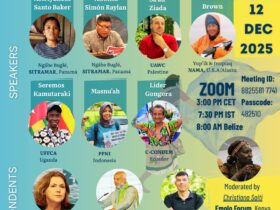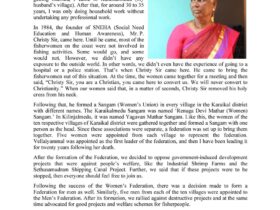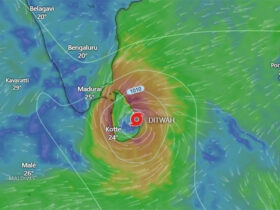Made by: World Forum of Fisher Peoples (WFFP) and International Collective in Support of Fishworker (ICSF)
Where: Eleventh Conference of Parties to the CBD. 8-19 October 2012
Statement made on Agenda Item 10: Marine and Coastal Biodiversity.
The World Forum of Fisher Peoples (WFFP) and the International Collective in Support of Fishworkers (ICSF) would like to highlight the concerns of small-scale and artisanal fishers from different parts of the world on this agenda item.
The need to integrate the traditional knowledge of indigenous peoples and local communities and to ensure their full and effective participation in the implementation of the Convention is well recognized, including in the various decisions of the Conference of Parties to the CBD. However it is unfortunate that these foundational principles have not been taken into account in the various processes initiated for the description of the Ecologically or Biologically Significant Marine and Coastal Areas (EBSAs).
We ask Parties to ensure that all work related to the description of EBSAs integrates the traditional, scientific, technical and technological knowledge of indigenous peoples and local communities, consistent with Article 8(j) and 10 (c). We further request Parties to ensure that there is full and effective participation of indigenous peoples and local communities, particularly fishing communities, in future regional and national workshops on EBSAs.
In this context we welcome the recommendations from the study on Identifying specific elements for integrating the traditional, scientific, technical and technological knowledge of indigenous and local communities, and social and cultural criteria and other aspects for the application of scientific criteria for identification of EBSAs as well as the establishment and management of marine protected areas (UNEP/CBD/SBSTTA/16/INF/10).
We urge Parties to take note of recommendations of this study and to develop socio-cultural criteria for EBSAs to be used alongside the existing scientific criteria, particularly in areas with pre-existing human populations/ uses, recognizing that the eventual management of the identified areas will be dependent on social, economic and cultural factors. Such an approach, which also takes cognizance of existing rights of indigenous peoples and local communities and their systems of governance, will have benefits for both biodiversity and livelihoods.
We have specific proposals for language for paras 15, 18 and 21. We will submit this separately to the Secretariat.
15: Welcomes the work of the Executive Secretary, generously funded by the Government of Germany, to develop the EBSA training manual and modules (UNEP/CBD/SBSTTA/16/INF/9), and requests the Executive Secretary to further refine the training manual and modules, as necessary, including further consultation with Parties, and indigenous peoples and local communities and the development of training materials on the use of traditional knowledge. When suitably revised, requests the Executive Secretary to translate the EBSA training manual and modules into the official United Nations languages, and invites Parties, other Governments and United Nations specialized agencies to use these training materials and other means, as appropriate, and, as far as possible, make necessary resources available for this purpose, in order to enhance the scientific and technical capacity within respective countries and regions with regard to describing areas that meet the criteria for EBSAs;
18: Welcomes the report Identifying specific elements for integrating the traditional, scientific, technical and technological knowledge of indigenous and local communities, and social and cultural criteria and other aspects for the application of scientific criteria for identification of EBSAs as well as the establishment and management of marine protected areas (UNEP/CBD/SBSTTA/16/INF/10), noting that the best available scientific and technical knowledge, including relevant traditional knowledge, should be the basis for the description of areas that meet the criteria for EBSAs, and that the participation of indigenous and local communities in regional EBSA workshops, as well as the use of social and cultural criteria, developed with the full and effective participation of indigenous peoples and local communities, is essential for any subsequent step of selecting conservation and management measures, particularly in areas with pre-existing human populations and uses.
21. Urges Parties and invites other Governments, the financial mechanism, and funding organizations to provide adequate, timely, and sustainable support to the implementation of training and capacity‑building and other activities related to EBSAs, especially for developing countries, in particular least developed countries and small island developing States and Parties with economies in transition, as well as indigenous peoples and local communities.




Leave a Reply